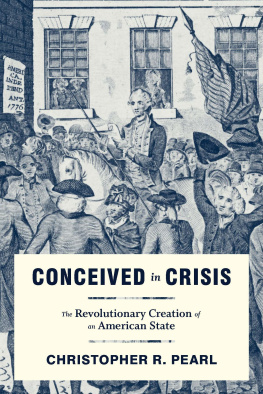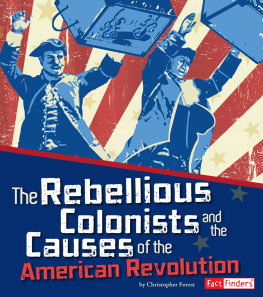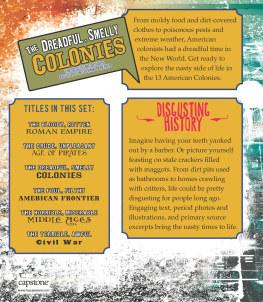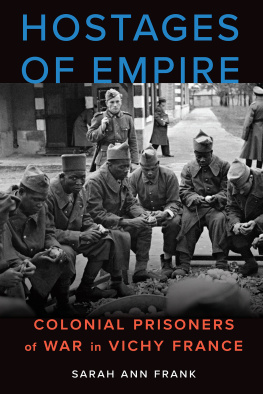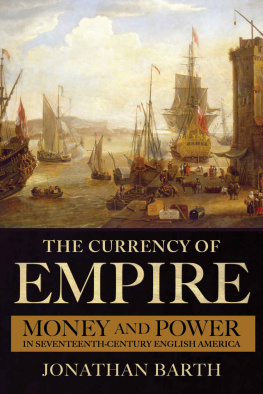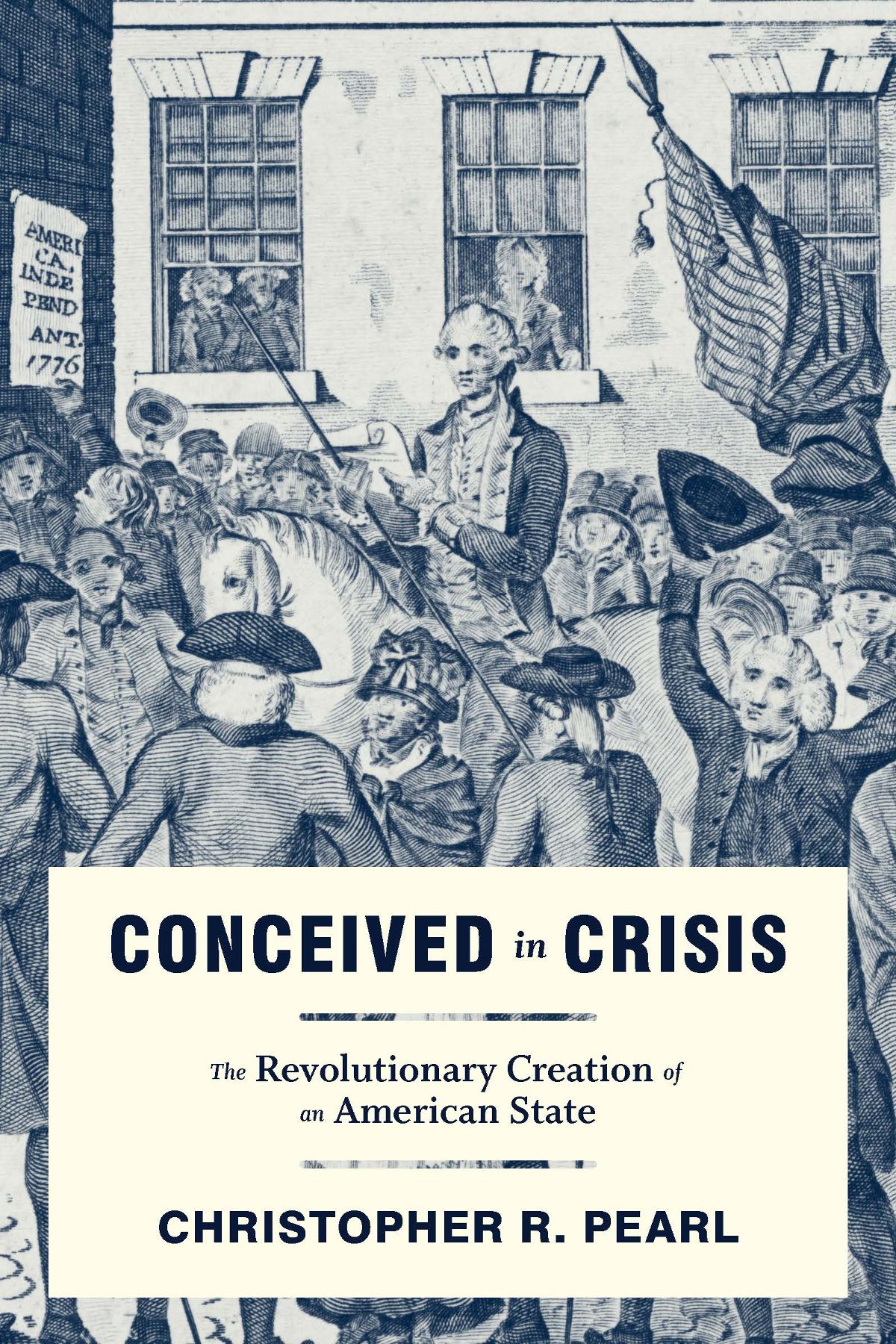Douglas Bradburn, John C. Coombs, and S. Max Edelson, Editors
Conceived in Crisis
The Revolutionary Creation of an American State

Christopher R. Pearl
University of Virginia Press
Charlottesville and London
University of Virginia Press
2020 by the Rector and Visitors of the University of Virginia
All rights reserved
Printed in the United States of America on acid-free paper
First published 2020
1 3 5 7 9 8 6 4 2
Library of Congress Cataloging-in-Publication Data
Names: Pearl, Christopher R., author.
Title: Conceived in crisis : the revolutionary creation of an American state / Christopher R. Pearl.
Description: Charlottesville : University of Virginia Press, 2020. | Series: Early American histories | Includes bibliographical references and index.
Identifiers: LCCN 2020004177 (print) | LCCN 2020004178 (ebook) | ISBN 9780813944548 (hardcover) | ISBN 9780813944555 (epub)
Subjects: LCSH: PennsylvaniaHistoryColonial period, ca. 16001775. | United StatesPolitics and governmentTo 1775. | United StatesHistoryRevolution, 17751783Causes.
Classification: LCC F152 .P269 2020 (print) | LCC F152 (ebook) | DDC 974.8/02dc23
LC record available at https://lccn.loc.gov/2020004177
LC ebook record available at https://lccn.loc.gov/2020004178
Cover art: The Manner in Which the American Colonies Declared Themselves Independant of the King of England, Throughout the Different Provinces, on July 4, 1776, c. 1783, engraving. (Library of Congress Prints and Photographs Division, Library of Congress)
For Kelley, Ella, and Jackson
Contents
C OMPLETING THIS BOOK has not been a solitary adventure but a deeply collaborative one for which I am indebted to many faithful advisors, institutions, friends, and family members. First and foremost, this book could not have been completed without financial and intellectual support from numerous institutions. When I first started the research for this book, I was extremely lucky to receive support from the Robert H. Smith International Center for Jefferson Studies. It was there that I began to see the contours of this project. Similarly, research fellowships at the American Philosophical Society, the William L. Clements Library at the University of Michigan, and the David Library of the American Revolution were instrumental. At all of those places I made amazing friends who offered an endless supply of encouragement and research assistance. I especially want to thank Roy Goodman and Kathie Ludwig. Roy helped me find obscure sources at the APS, always had words of encouragement, and made my time in Philadelphia enjoyable with great food and baseball. Kathie has been indispensable to the research for this book. Over the years, the David Library has become a kind of second home, and I always look forward to walking into the library and chatting with Kathie. I cannot thank her enough for the assistance she provided, especially finding manuscripts and sending me digital copies when I could not make a trip to the library. Thank you, Kathie. You are awesome!
At Binghamton University, I was fortunate to work with outstanding faculty who provided endless support. My PhD advisor, Douglas Bradburn, nurtured a kernel of an idea into something a young graduate student never could have imagined, especially that that idea would one day become a book. I am deeply indebted to Doug, whom I pestered way too often, but who never turned me away and always found time to sit and talk through the project, pushing me to sharpen my arguments and recognize their significance. He made graduate school bearable with his generosity and humor. At Binghamton I also had the good fortune to work with Diane Sommerville, who read and commented on EVERYTHING . Her exacting red pen and critical questioning has saved me from many a blunder. Diane has been a supportive advisor and encouraging friend. I cannot thank her enough.
Trying to take the rough ideas from a dissertation and turn them into a book is no easy process. I am eternally grateful to the friends, colleagues, and students who made it possible. First off, I would like to thank my home institution, Lycoming College, especially Phil Sprunger, for the financial support to conduct further research and to hire student assistants. To my undergraduates, thank you so much. Miranda Beers, Sarah Donovan, Rebecca Reed, and Maggie Slawson were the best students a professor could ask for. They verified footnotes, tracked down sources, and helped me talk through numerous sections of this book. More importantly, their passion for early American history kept me enthusiastic about a project I have been working on for way too long. To my colleagues in the history department, Cullen Chandler, Laura Seddelmeyer, and Sarah Silkey, thanks for the encouragement, conversations, and research excursions. You all are the best. Throughout the research and writing of this book I met many excellent and generous people who helped refine my ideas through stimulating conversations and the critical reading of all or part of the developing manuscript, including the many participants in the Upstate Early American Seminar, Greg Brooking, Joshua Canale, Andrew Fagal, Matthew Spooner, Matthew Williams, William Tatum, Jessica Roney, Kenneth Owen, Paul Moyer, Patrick Spero, Max Edling, Robert Parkinson, and the late Bill Pencak. A special thanks to Owen S. Ireland, who sparked my interest in the American Revolution and Pennsylvania in particular, and who has been a constant source of support and encouragement.
Last but not least, I would like to thank my family. To my father and mother, thank you for nurturing and encouraging my passion for history from a young age, even if you do not find history as exciting as I do. To my wife, Kelley, you made this book possible with your encouragement and love. She has had to live with this project for most of our marriage, listen to me go on and on about the American Revolution, and even read the manuscript when we were both too tired to function as new parents. She can always see things that I cannot. To my kids, Ella and Jackson, thank you for working on Daddys book and providing me with endless diversions. I will miss hearing small feet descend the stairs to bring me a late-night snack and good company while I worked on the book.
Conceived in Crisis

T HE A MERICAN R EVOLUTION led to the creation of powerful, extractive, coercive, and regulatory states. Such a statement, while it may not reflect the thrust of histories about the American Revolution, certainly reflected reality for revolutionaries and budding nationalistslater known as Federalistssuch as John Jay, George Washington, and Henry Knox. In 1786, after a string of dire letters from Jay expressing the crisis facing the American nation due to the power of the states, Washington, trying to enjoy a semblance of retirement at Mount Vernon, responded that he shared Jays concerns. His entire revolutionary experience led him to believe that a single coercive power needed to be lodged in a consolidated government. The states, as of that moment, had all of the coercive power, and Washington wanted a general government to be as energetic and have the same authority as the different state governments extends over the several States.

